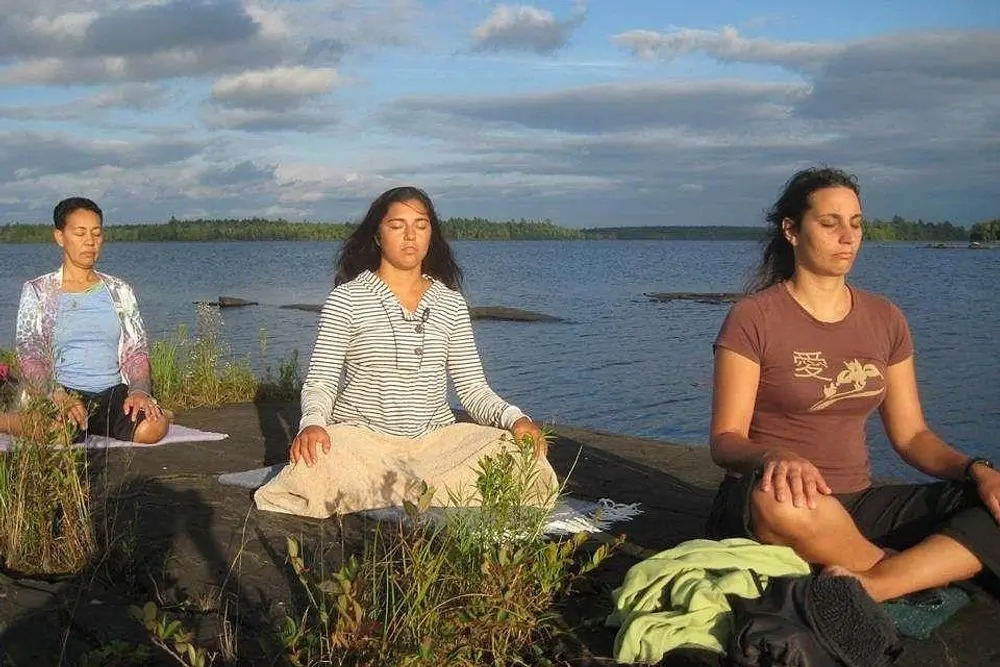Understanding Mindfulness in Nature
As we immerse ourselves in the serenity of the natural world, mindfulness nature retreats have become a sanctuary for those of us seeking tranquility and a deeper connection with the environment. Let’s delve into the scientific underpinnings of mindfulness and the myriad benefits that outdoor retreats offer.
The Science of Mindfulness
The essence of mindfulness lies in fostering awareness and a nonjudgmental acceptance of our moment-to-moment experiences, which can be cultivated through practices such as mindfulness meditation. Since the 1970s, mindfulness has been woven into Western medicine and psychology, leading to the development of various interventions aimed at improving mental well-being. A study in the “Journal of Environmental Psychology” highlights that mindfulness nature retreats are proven to reduce stress and enhance overall well-being. These retreats create an ideal setting for mindfulness practices, which have been associated with a myriad of positive psychological effects, including heightened well-being, diminished psychological symptoms, and improved emotional and behavioral regulation.
Benefits of Outdoor Retreats
Mindfulness nature retreats offer a respite from the hustle and bustle of daily life, allowing us to disconnect from distractions and reconnect with both nature and our inner selves. The fusion of mindfulness practices with the restorative power of nature can lead to heightened self-awareness and overall wellness. Time spent in nature, as research suggests, can lower stress levels, uplift mood, and bolster cognitive performance. By engaging in activities such as meditation, yoga, and mindfulness nature journaling, participants can develop a sense of presence and gratitude for their surroundings. These nature-based mindfulness techniques, experienced within the peaceful confines of a retreat, can enhance mental clarity, creativity, and emotional resilience. The holistic approach of these retreats contributes to a comprehensive wellness experience, as individuals unplug, de-stress, and nurture a deeper bond with themselves and the world around them. For more insights into the positive impacts of integrating nature into our mindfulness practice, explore the benefits of nature mindfulness.
The Elements of Mindfulness Retreats
Embarking on mindfulness nature retreats allows us to slow down and immerse ourselves in the tranquility of the natural world. These retreats are designed to cultivate gratitude, self-awareness, and a sense of presence in the moment, which can significantly impact our mental and physical well-being.
Activities and Practices
At the heart of mindfulness nature retreats are activities and practices that encourage participants to engage fully with the present moment. These may include:
According to Josephine Robertson, these practices allow participants to disconnect from the hustle of daily life and reconnect with themselves and the environment around them.
Structured Meditation and Yoga
Structured meditation and yoga are integral components of mindfulness retreats. These practices offer a framework for cultivating inner peace and relaxation. Positive Psychology suggests that:
- Structured meditation sessions guide individuals through techniques that enhance mental clarity and emotional resilience.
- Yoga classes tailored to all levels help to harmonize the body and mind, often taking place in serene outdoor settings.
Both meditation and yoga are well-regarded for their psychological benefits, including improved mood and reduced stress levels, as highlighted by the APA.
Connection with Nature
The connection with nature is a fundamental aspect of mindfulness retreats. Participants are encouraged to spend time in natural settings, which has been shown to:
- Reduce symptoms of anxiety and depression
- Enhance feelings of vitality and improved mood
- Provide a sense of rejuvenation and emotional balance
By combining mindfulness practices with nature’s healing power, participants create a unique opportunity to destress and foster a deeper connection with the natural world. This holistic approach to well-being, as noted by APA, can have lasting positive effects on mental health and quality of life.
Additionally, experiences such as guided nature walks and outdoor meditation sessions can significantly enhance one’s awareness of the present moment, leading to greater inner peace and relaxation. LinkedIn suggests that natural landscapes are profoundly healing and inspire profound shifts in our brains, bodies, emotions, thought processes, and social interactions.
By choosing to join a mindfulness nature retreat, you are not only investing in your mental health but also in a deeper appreciation for the environment and the benefits it offers. For more insights into the transformative impact of nature on our well-being, explore the benefits of nature mindfulness.
Psychological Benefits of Retreats
Embarking on mindfulness nature retreats can have a transformative impact on our psychological health. From the serenity of undisturbed landscapes to the gentle rhythm of natural living, these retreats offer a sanctuary for mental clarity and emotional rejuvenation.
Stress Reduction and Well-being
We live in a world that seldom stops buzzing. The constant influx of notifications and deadlines can lead to chronic stress, which is detrimental to our well-being. Mindfulness nature retreats serve as an antidote to this relentless pace, providing a space where we can disconnect from the noise and reconnect with ourselves. A study published in the “Journal of Environmental Psychology” in May 2020 highlights how these retreats significantly reduce stress and enhance overall well-being. By engaging in nature mindfulness exercises, we allow our minds and bodies to relax, recover, and restore a sense of inner peace.
Emotional Regulation and Awareness
Mindfulness practices teach us to observe our emotions without judgment, understanding them as transient states rather than defining characteristics. This heightened awareness promotes emotional regulation—an essential skill for navigating life’s ups and downs with grace. The psychological effects of mindfulness, as noted, include improved emotional reactivity and behavioral regulation. By fostering a non-reactive state of mind, we enhance our capacity to handle stressors and maintain emotional stability. Engaging in activities like mindfulness nature journaling can be particularly effective in cultivating this skill, as it encourages reflection and self-expression.
Long-Term Mental Health Improvements
The benefits of mindfulness nature retreats extend far beyond the immediate experience. Trait mindfulness, which develops over time with consistent practice, has been correlated with lasting enhancements in life satisfaction, self-esteem, optimism, and empathy. It’s also associated with a reduction in depression, neuroticism, and social anxiety. Research indicates that vacations that include meditation practices can lead to sustained increases in mindfulness and well-being, with effects lasting for weeks after returning to routine life. Furthermore, meditation retreats have been linked to enduring improvements in adaptive functioning and various facets of well-being, reinforcing the value of incorporating nature-based mindfulness techniques into our lives.
By integrating the restorative power of nature with mindfulness, these retreats offer a potent formula for psychological healing and growth. As we immerse ourselves in the tranquility of the natural world and engage in mindful practices, we lay the groundwork for profound and enduring mental health benefits. For more insights into the advantages of this approach, explore our detailed guide on the benefits of nature mindfulness.
The Physical Aspect of Mindfulness
Participating in mindfulness nature retreats is more than just an emotional or spiritual experience; it also has profound physical effects. Let’s delve into the impact of mindfulness on brain activity and overall health.
Impact on Brain Activity
Mindfulness is associated with marked changes in brain activity. Research has shown that mindfulness practices, such as meditation, can lead to reduced activation in the amygdala, which is associated with stress and fear responses (PubMed Central). Simultaneously, there’s an increase in activation of the prefrontal cortex, the area of the brain responsible for higher-order brain functions like decision-making and self-regulation.
Additionally, mindfulness-based stress reduction, which often combines meditation and yoga, may be particularly beneficial for individuals with depression by affecting brain structures like the hippocampus. The hippocampus, vital for memory and learning, is known to be impacted by depression. Mindfulness practices help in maintaining neural connections in this crucial region, as studies by Harvard Medical School and Massachusetts General Hospital have indicated (Harvard Gazette).
Effects on Overall Health
Mindfulness practices, often integral to nature retreats, have a ripple effect on various aspects of well-being. Meditation, including Shamata—which focuses on developing attention and monitoring psychological processes—has been found to enhance overall mindfulness, well-being, and perceived stress levels (NCBI). The structured environment of mindfulness nature retreats allows for these practices to be nurtured and sustained.
Research indicates that being in nature, coupled with mindfulness practice, can lead to a reduction in anxiety, depression, and other mental health concerns (APA). This connection to the natural world not only improves mental health but also contributes to physical well-being by fostering increased feelings of vitality and improved mood. Moreover, participants often report feeling rejuvenated and achieving greater emotional balance as a consequence of their retreat experiences.
Incorporating nature-based mindfulness techniques into retreats offers a holistic approach to well-being, providing enduring benefits to mental health and overall quality of life. By fostering a deeper connection with the self and the environment, these retreats serve as a powerful tool for individuals aiming to enhance their mental and physical health through eco-friendly living and outdoor mindfulness practices.
Choosing the Right Retreat
In our search for mental clarity and physical rejuvenation, we may find solace in the tranquil embrace of nature. Mindfulness nature retreats offer an oasis away from the cacophony of daily life, allowing us to reconnect with the natural world and ourselves. Selecting the right retreat is essential for those of us deeply invested in enhancing our well-being through nature-based therapies and mindfulness practices.
Types of Nature Retreats
Mindfulness nature retreats come in various formats, each offering unique experiences and activities that cater to different preferences. Some retreats focus on silent meditation in the wilderness, while others might offer a more structured schedule with nature walks, yoga sessions, and nature mindfulness exercises.
Here are a few types of retreats we might consider:
- Wilderness Retreats: Immerse yourself in the wild, participating in activities like hiking and wildlife observation.
- Yoga and Meditation Retreats: Combine the practice of yoga with meditation sessions in natural settings.
- Therapeutic Nature Retreats: Engage in therapy sessions coupled with nature-based mindfulness techniques.
- Creative and Reflective Retreats: Indulge in mindfulness nature journaling or other forms of creative expression inspired by the serene environment.
Each retreat has a unique approach to fostering a deep connection with nature, which has been shown to improve mental health and contribute positively to our overall mindfulness practice (APA).
What to Expect
When attending a mindfulness nature retreat, we can expect to unplug from technology and engage in a variety of activities designed to promote relaxation, self-reflection, and a deeper connection to the environment. These may include:
- Guided nature walks to explore and appreciate the surrounding landscape.
- Meditation sessions in natural settings to cultivate presence and awareness.
- Outdoor yoga classes to enhance physical flexibility and mental tranquility.
- Reflective journaling or creative activities inspired by the beauty of nature.
These activities are not only enjoyable but also integral in supporting mental health and well-being (Josephine Robertson). Additionally, we can anticipate the nurturing presence of like-minded individuals, all seeking the restorative powers of the natural world.
Cost Considerations
The cost of mindfulness nature retreats can vary widely based on the location, duration, and amenities offered. We must consider our budget and what we hope to gain from the experience. Some retreats might be all-inclusive, providing lodging, meals, and activities, while others may offer a la carte options.
| Retreat Type |
Estimated Cost Range |
| Weekend Retreats |
$200 – $500 |
| Weeklong Retreats |
$500 – $2000 |
| Luxury Retreats |
$2000+ |
It’s encouraged to research and compare different retreats to find one that aligns with our financial means and wellness goals. Keep in mind that the investment in a retreat is also an investment in our long-term health and benefits of nature mindfulness.
Choosing the right mindfulness nature retreat is a personal journey. We must weigh the types of retreats, set realistic expectations, and consider the costs involved. By doing so, we ensure that our retreat experience is not only enjoyable but also profoundly beneficial for our mental and physical well-being.
Preparing for a Mindfulness Retreat
As we gear up for a transformative experience at a mindfulness nature retreat, it’s vital that we prepare adequately. Let’s dive into the essentials to pack, how to mentally brace ourselves, and the importance of setting intentions for the journey ahead.
Packing Essentials
When attending mindfulness nature retreats, packing should be approached with simplicity and intention. Here’s a checklist to ensure that we have everything needed to embrace the retreat fully:
- Comfortable clothing suitable for various weather conditions and outdoor activities
- Sturdy footwear for guided nature walks and exploration
- Personal meditation aids, such as a cushion or mat
- A notebook or journal for mindfulness nature journaling
- Any prescribed medications and a basic first-aid kit
- Reusable water bottle to stay hydrated
- Sun protection: sunscreen, hat, sunglasses
- Insect repellent to keep bugs at bay
- Personal toiletries, preferably eco-friendly and biodegradable
- A small backpack or daypack for carrying essentials during outdoor activities
Remember, the focus is on uncluttered living, so packing light and with purpose is key.
Mental Preparation
Mental preparation is as crucial as the physical aspect. To reap the full benefits of a retreat, it’s essential to begin with an open and receptive state of mind. Here are some strategies for mental preparation:
- Familiarize yourself with nature-based mindfulness techniques to enhance your readiness for the retreat’s activities.
- Start incorporating short, daily meditation sessions to ease into a routine.
- Gradually reduce the use of electronic devices to minimize digital distractions.
- Reflect on personal goals and what you wish to achieve through this retreat.
- Embrace the mindset of being present and fully engaged in each moment of the retreat experience.
Setting Intentions
Setting intentions is a powerful practice that can guide our experience and focus our attention during the retreat. Consider these steps:
- Reflect on your motivations for attending the retreat.
- Contemplate areas of your life that you wish to improve or grow in.
- Formulate clear, positive affirmations that embody your goals for the retreat.
- Share your intentions with fellow participants or write them down, solidifying your commitment.
By setting intentions, we create a roadmap for our retreat experience, allowing us to navigate the journey with purpose and direction.
Preparing for a mindfulness retreat involves thoughtful planning, both practically and mentally. As we pack our essentials and engage in mental exercises, we set the stage for a truly enriching experience. Mindfulness retreats provide a sacred space to disconnect, reflect, and grow. Through this preparation, we can enter the retreat ready to embrace the transformative power of nature and mindfulness.
FAQs (Frequently Asked Questions)
What is Mindfulness in Nature? Mindfulness in nature emphasizes being fully present and engaged with the environment, fostering a non-judgmental acceptance of moment-to-moment experiences through activities like meditation and yoga in natural settings.
How Do Mindfulness Nature Retreats Benefit Mental Health? These retreats offer a break from daily stress, enhancing well-being by lowering stress levels, improving mood, and boosting cognitive performance through a blend of mindfulness practices and nature immersion.
What Activities Can I Expect at a Mindfulness Nature Retreat? Expect guided meditation, nature mindfulness journaling, group discussions, personal reflection time, and mindfulness exercises like silent walks or sensory awareness activities in natural settings.
Can Mindfulness Retreats Improve Long-Term Mental Health? Yes, consistent practice at retreats can lead to sustained improvements in life satisfaction, self-esteem, and a reduction in depression, anxiety, and stress, with benefits lasting beyond the retreat.
What Should I Pack for a Mindfulness Retreat? Pack comfortable clothing for various weather conditions, sturdy footwear, a meditation cushion or mat, a journal, prescribed medications, a reusable water bottle, sun protection, insect repellent, personal toiletries, and a small backpack.






